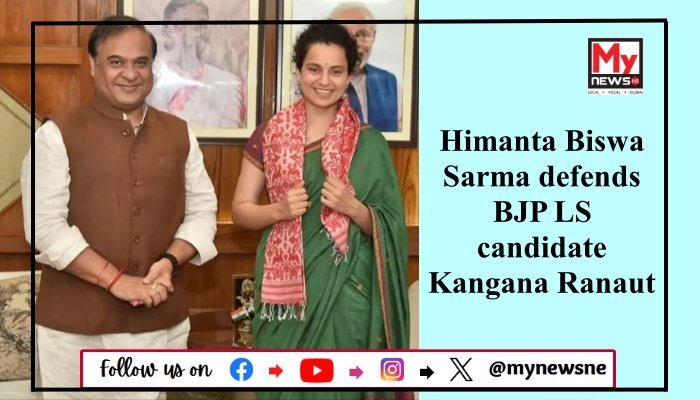


Assam Chief Minister Himanta Biswa Sarma has come to the defense of actor-turned-politician Kangana Ranaut, who sparked controversy with her claim that Netaji Subhas Chandra Bose was the first Prime Minister of India. Sarma stated that Netaji had established the Azad Hind government, recognized by nine countries, four years before Pandit Jawaharlal Nehru became Prime Minister. He also criticized those who mock Ranaut's statements as having a "colonialist mentality." Ranaut made the claim during a media summit, with the video clip going viral on social media.
Background
Netaji Subhas Chandra Bose was a prominent Indian nationalist leader during the Indian independence movement. He is best known for his role in establishing the Indian National Army (INA) and leading it against the British during World War II. However, Bose's political journey and legacy have been the subject of ongoing debate and controversy.
One of the most controversial claims about Bose is that he was the first Prime Minister of India. This claim has been made by certain historians and supporters of Bose, but it is not widely accepted by mainstream historians.
Assam Chief Minister's Defense
Recently, Assam Chief Minister Himanta Biswa Sarma came to the defense of actor-turned-politician Kangana Ranaut, who sparked controversy by claiming that Netaji Subhas Chandra Bose was the first Prime Minister of India. Sarma stated that Netaji had established the Azad Hind government, which was recognized by nine countries, four years before Pandit Jawaharlal Nehru became Prime Minister. He also criticized those who mock Ranaut's statements as having a "colonialist mentality."
Top 5 FAQs and Answers
1. Was Netaji Subhas Chandra Bose the first Prime Minister of India?
Answer: No, according to mainstream historians, Pandit Jawaharlal Nehru was the first Prime Minister of India after independence in 1947.
2. What was the Azad Hind government?
Answer: The Azad Hind government was a provisional government of India formed by Netaji Subhas Chandra Bose and his supporters during World War II. It was based in Southeast Asia and sought to liberate India from British rule.
3. How many countries recognized the Azad Hind government?
Answer: Nine countries, including Japan, Germany, Italy, and Burma, recognized the Azad Hind government.
4. Who established the Indian National Army (INA)?
Answer: Netaji Subhas Chandra Bose established the Indian National Army (INA) in 1942.
5. What is the controversy surrounding Netaji's disappearance?
Answer: Netaji Subhas Chandra Bose's disappearance after the end of World War II remains a mystery. There are several theories about his fate, including that he died in a plane crash, escaped to the Soviet Union, or continued to live in India incognito.
Conclusion
The claim that Netaji Subhas Chandra Bose was the first Prime Minister of India is a controversial one that lacks mainstream historical support. While the Azad Hind government established by Netaji did gain some international recognition, it was never formally recognized as the government of India by the British or the Indian National Congress. Nonetheless, Bose's legacy as a prominent nationalist leader and his contributions to the Indian independence movement continue to be debated and discussed today.

President Droupadi Murmu addressed probationers of the Indian Police Service 77 RR (2024 batch) and emphasized the significant role that effective policing and future-ready technology play in promoting growth and attracting investment in any state. She highlighted the transformational impact of technology in the realm of policing and urged young officers to remain ahead in adopting new technologies, including AI, to combat threats to citizens. The President also encouraged ethical decision-making and accountability among young officers occupying positions of power and authority.

CEC Gyanesh Kumar has announced the second phase of the Special Intensive Revision (SIR) of electoral rolls in 12 states and Union Territories, covering 51 crore voters. He also addressed concerns over the state of West Bengal, clarifying that there is no confrontation between the Election Commission and the state government. Additionally, he reminded that Aadhaar card is not proof of citizenship, but can be used as identity proof in the SIR process.

After Chief Justice Gavai's formal recommendation, Union Government is set to appoint Justice Surya Kant as the next Chief Justice of India. With a distinguished legal career and key institutional roles, Justice Kant is highly regarded for his commitment to electoral transparency and landmark verdicts on various issues including abrogation of Article 370 and free speech. His term is expected to begin on November 24, 2025, and last for approximately 15 months.

On Monday, Union Home Minister Amit Shah inaugurated the fourth edition of the India Maritime Week 2025, where renowned leaders, policymakers, and maritime experts from India and abroad are expected to participate over the next 5 days. In his keynote speech, Shah highlighted India's growing maritime strength and strategic location, citing the government's efforts to increase port handling capacity and develop new mega and deep-draft ports. He also inaugurated state-of-the-art Deep-Sea Fishing Vessels under the Pradhan Mantri Matsya Sampada Yojna at Mumbai's Mazagaon Dock. The event, organised by the Ministry of Ports, Shipping and Waterways, is being held in partnership with the Indian Ports Association and will conclude on October 31.

The annual Chhath Puja festival has once again become a battleground for Delhi's political parties, with the AAP accusing the BJP-led government of creating an "artificial Yamuna" to cater to PM Modi's ceremonial dip while ordinary devotees are forced to pray in the highly-polluted river. While AAP leaders criticize BJP for disregarding the sentiments of devotees, the latter defends their preparations, citing "unprecedented arrangements" for the festival. However, as the parties argue, environmental reports continue to warn about the dangerous levels of pollution in the Yamuna, posing a serious threat to the health of devotees.

Prime Minister Narendra Modi took to social media to share his Diwali celebration on board the INS Vikrant with the Indian Navy. He expressed his gratitude for the opportunity and highlighted the juxtaposition of the vast ocean and Mother India's brave soldiers. The Prime Minister also witnessed an impressive Air Power Demo and participated in the Bara Khana with naval personnel.

The Mahadev Khola Dham Welfare Trust in Meghalaya has accused local authorities of violating the rights of the Hindu community during Diwali celebrations. The Trust claims that an order issued by the Deputy Commissioner of East Khasi Hills, ordering the closure of a shop selling puja materials, infringes on their constitutional rights. The Trust, which has been a place of worship for over a century, argues that this order was made without proper notice or verification and goes against earlier permission granted for the shop to operate during the festival. They have appealed for the withdrawal of the order and the safeguarding of their religious and cultural heritage.

As Chhath celebrations are underway in Delhi, the AAP has accused the BJP of creating an artificial ghat at Vasudev Ghat and filling it with filtered water for PM Modi's ceremonial dip. The BJP has denied the allegations and called them a display of political frustration. The issue has sparked a political controversy with AAP's top leaders launching an attack on X and accusing the BJP of insulting the religious sentiments of Chhath devotees. With the state elections in Bihar approaching, the festival has gained political significance for both parties.

Delhi Chief Minister Rekha Gupta insures that extensive preparations have been made for the Chhath festival this year for Purvanchal brothers and sisters at all Yamuna ghats from Palla to Kalindi. Art and Culture Minister Kapil Mishra joined BJP Delhi President Virendra Sachdeva in visiting several Chhath Ghats across Delhi to review arrangements, including cleanliness, lighting, safety, and traffic management. Together, they ensure a memorable Chhath festival for devotees with the blessings of Chhathi Maiya.

Kerala General Education Minister V Sivankutty has clarified that the state government agreed to join the Centre's PM SHRI scheme to prevent the loss of approximately ₹1,500 crore in central funds. He stated that the state will not compromise on its education policies and will continue to publish its own textbooks. With the agreement allowing either party to withdraw at any time, the minister asserted that Kerala has the right to approach the court if necessary. He added that funds from the scheme are also used to support autism centres and other projects in the state, making it crucial for the education department to take steps to prevent the loss of funds.